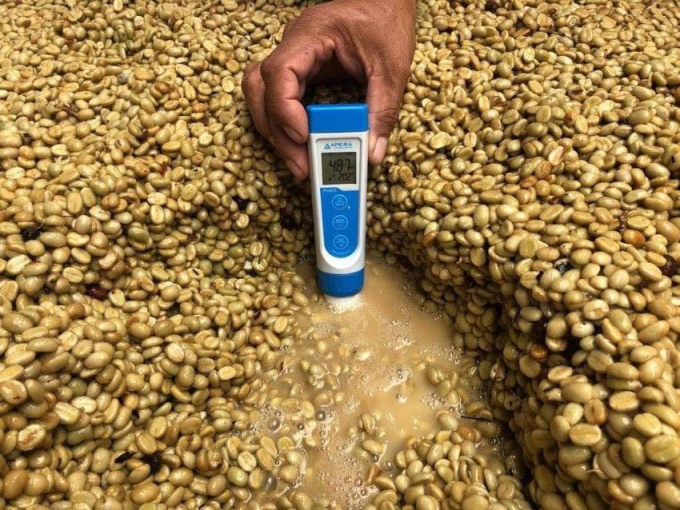May 24, 2025 | 16:25 GMT +7
May 24, 2025 | 16:25 GMT +7
Hotline: 0913.378.918
May 24, 2025 | 16:25 GMT +7
Hotline: 0913.378.918
To improve the position of Vietnamese coffee, it is essential to emphasize added value, use processing technologies to diversify goods, and cater to customer preferences...
Recently, Hoang Gia Trading Development & Import-Export Joint Stock Company partnered with Canada-based Lallemand Corporation, which has over a century of experience developing and manufacturing products from bacteria and yeast, to host a conference on how biotechnology can be used to improve the quality of Vietnamese Robusta & Arabica coffee.
Representatives from the Agricultural Products Processing and Development Department, the Department of Science and Technology in Dak Nong, as well as many scientists and specialists from the business and corporation, attended the event.

Nguyen Quoc Toan, Director of the Department of Agricultural Products Processing and Development under MARD.
Attendees distributed ideas and results of experiments in Vietnamese coffee, thus contributing to the discovery of new techniques and methods for improving the quality of Vietnamese coffee and moving the country closer to a clean, organic, and added-value agriculture.
According to Nguyen Quoc Toan, Director of the Department of Agricultural Products Processing and Development, Vietnam's coffee plays a critical role in the export industries and consumption habits of people worldwide. As a result, Vietnam is always conscious that a nation with a coffee brand must continually strive for improvement.
Additionally, coffee is a daily beverage for the worldwide population as well as the Vietnamese. Since a coffee-producing nation, tracking and updating consumer habits throughout the globe is crucial, as coffee tastes and the nature of coffee consumption vary by region.
As the world's second-largest exporter of coffee, several nations have invested in and increased their imports of Vietnamese coffee, with the EU, the US, Japan, and South Korea being the primary markets. As a result, the Vietnamese coffee industry continues to grow.
However, Toan highlighted certain obstacles. In 2020, Vietnam exported 1.51 million tons of coffee for USD 2.66 billion in value, a drop in both numbers from 2019 and previous years. Currently, only 5% of Vietnam's coffee products are deep-processed, such as roasted coffee and instant coffee. The remainder is mostly raw exports.
Overcoming the value and volume barrier in order to enter large markets such as Northeast Asia and China, where instant coffee is heavily consumed. This is a matter of grave worry for state management authorities, Toan said. As a result, Toan anticipated that specialists attending the conference will collaborate with state management authorities to find a solution to this backlog.

Measure PH content during coffee fermentation.
Vietnam is now pursuing a smart and organic agricultural model centered on added value, and the coffee sector is not immune to this trend. As a result, Toan believes that it is essential to concentrate on deep processing and the value chain, rather than just processing coffee and exporting it to other nations for processing. “We need to do it from the start to minimize expenses, narrow the gap between coffee collecting and middleman and distribution, transportation and logistics, and finally to the consumers,” Toan explained.
Toan emphasized his hope for professionals and scientists to provide input so that Vietnam's agricultural product processing sector may reach the top ten in the world in the next five years, as the Prime Minister has stated. To accomplish this objective, the coffee industry, in particular, is a very big and highly interconnected sector, with many coffee companies establishing a presence in the global market. Businesses must establish a relationship and seed the coffee business in order for it to develop into a lucrative and high-class product. Simultaneously, it guarantees farmers' livelihoods, company revenues, and the Vietnamese coffee brand's image.
Translated by Linh Linh

(VAN) The People's Committee of Tra Vinh province has approved an adjustment to the investment policy for the Green Hydrogen Plant project, increasing its area to approximately 52.76 hectares.
![Reducing emissions from rice fields: [2] Farmers’ commitment to the soil](https://t.ex-cdn.com/nongnghiepmoitruong.vn/608w/files/news/2025/05/05/dsc08881jpg-nongnghiep-140632.jpg)
(VAN) Clean rice cultivation model in Thuong Tan commune, Bac Tan Uyen district, is assisting local residents in achieving sustainable agriculture by substantially reducing costs, increasing productivity, and protecting the environment.

(VAN) At the conference to disseminate Resolution No. 68, AgriS introduced its digital agricultural ecosystem and reaffirmed its commitment to accompanying the Government in promoting private sector development and sustainable agriculture.

(VAN) 'Blue Ocean - Blue Foods' initiative is designed to restore marine ecosystems and establish sustainable livelihoods for local communities by cultivating a minimum of 1,000 hectares of cottonii seaweed in the first three years.
/2025/05/21/4642-3-112707_603.jpg)
(VAN) The V-SCOPE project has made direct contributions to three out of six pillars of the Comprehensive Strategic Partnership between Vietnam and Australia.

(VAN) Facing the threat of rabies spreading to the community, Gia Lai province urgently carries out measures to vaccinate dogs and cats on a large scale.

(VAN) Disease-free livestock farming not only protects livestock herds but also stabilizes production and livelihoods for many farmers in Tuyen Quang.